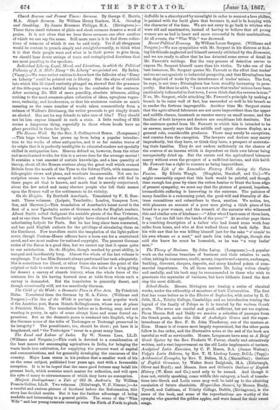Recent Political Economy. By William Lucas Sargent. (Williams and Norgate.)—We
can sympathize with Mr. Sargent in his distress at find- ing his friends neglected and himself severely criticized by the Economist, and we are ready to allow that he has detected some errors of detail in Mr. Fawcett's writings. But the very proceis of detection serves to expose Mr. Sargent himself more than his victim. To take one of the best instances, Mr. Sargent quotes Mr. Fawcett to the effect that trade's' unions are antagonistic to industrial prosperity, and that Birmingham has. been deprived of trade by the interference of trades' unions. The fact, he says, is not tree ; Birmingham has been steadily increasing in pros- perity. But then he adds, "I am not aware that trades' unions have been particularly influential in that town, I even think that the reverse is-true." If so, Mr. Sargent, while attacking Mr. Fawcett's principle by making a breach in its outer wall of fact, has succeeded so well in his breach as to render the fortress impregnable. Another time Mr. Sargent states that the agricultural labourers are not more improvident than the upper and middle classes, inasmuch as curates marry on small means, and the families of both lawyers and doctors are sometimes loft destitute. Yet the sentence quoted from Mr. Fawcett to which this is intended to be- an answer, merely says that the middle and upper classes display, as a general rule, considerable prudence. There may surely be exceptions, and curates form the exception. The lawyers and doctors may marry imprudently, but they have, or think they have, a prospect of maintain- ing their families. They do not reckon sufficiently on the chance of the sources of an income which is dependent on their own labour being unexpectedly dried up. But the curate and the agricultural labourer marry without even the prospect of a sufficient income, and this habit Mr. Fawcett has a right to censure as being improvident.






























 Previous page
Previous page